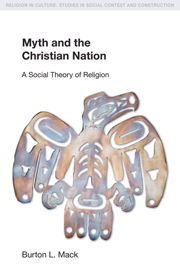Book contents
- Frontmatter
- Contents
- Dedication
- Preface
- Introduction
- Part I The Religions of Other Peoples
- Chapter 1 Looking for Religion in the New World
- Chapter 2 Noticing Social Interests in Myths and Rituals
- Chapter 3 Watching Myths in the Making
- Chapter 4 Thinking with Myths about Culture
- Part II The Religion of Christianity
- Conclusion
- Bibliography
- Index
Chapter 4 - Thinking with Myths about Culture
from Part I - The Religions of Other Peoples
- Frontmatter
- Contents
- Dedication
- Preface
- Introduction
- Part I The Religions of Other Peoples
- Chapter 1 Looking for Religion in the New World
- Chapter 2 Noticing Social Interests in Myths and Rituals
- Chapter 3 Watching Myths in the Making
- Chapter 4 Thinking with Myths about Culture
- Part II The Religion of Christianity
- Conclusion
- Bibliography
- Index
Summary
In the last two chapters we have been exploring the reasons for myths and rituals in relation to the human enterprise of social construction. The emphasis has been upon the interests humans have in living together and upon the intellectual labor involved in the construction of the many systems that structure the activities of a society and keep it working. A theme has been followed in the descriptions of the construction of myths and rituals, namely, that they too are a result of intellectual labor and are to be seen as no different in this respect from other systems of signs and patterns of practices fundamental for social existence. The suspicion has been that myths and rituals are important, if not necessary, ingredients within the sets of signs that structure a society, but that suspicion has not been explored until now. Since this emphasis upon social interests and the intellectual labor involved in the imagination and construction of myths and rituals differs from popular conceptions of religion, it has been necessary to move slowly in the development of alternative concepts and terminology. We are now ready, however, to consider the function of myths and rituals within a society and to explore the specific contributions they may make to its construction and maintenance. This can be done by developing the concepts of (1) the imagined world, (2) thinking with myths, (3) transforming myths, and (4) a mythic mentality.
- Type
- Chapter
- Information
- Myth and the Christian NationA Social Theory of Religion, pp. 120 - 144Publisher: Acumen PublishingPrint publication year: 2008



